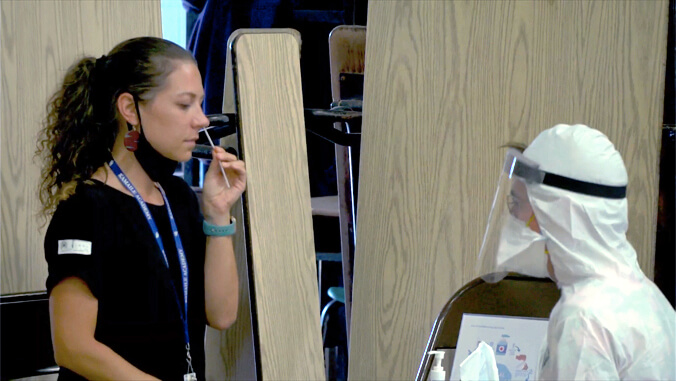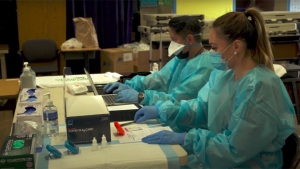
A University of Hawaiʻi at Mānoa-led public-impact project to improve safety in schools through COVID-19 testing and teacher education has greatly expanded to some of the hardest-hit areas in the state, thanks to a recent $3 million award from the National Institutes of Health.

After a successful spring pilot COVID-19 testing program at Kamaile Academy, weekly testing is now taking place at four additional locations in West Oʻahu (Waiʻanae High School, Nānākuli High and Intermediate School, Papahana ʻo Kaiona and Waiʻanae Coast Comprehensive Health Center), which is currently seeing a COVID-19 case surge and double digits in the daily positivity rate in the community.
Testing has also begun this week at three Hawaiʻi Island locations (Honokaʻa Armory, Kohala High Gym and Thelma Parker Gym), with more expected in the coming weeks in Windward Oʻahu.
The project is led by the Pacific Alliance Against COVID-19 (PAAC), a collaborative effort between UH Mānoa’s College of Social Sciences, John A. Burns School of Medicine (JABSOM) and College of Education, and the Accountable Healthcare Alliance of Rural Oʻahu.
The Kamaile Academy pilot project resulted in 87% of participants reporting their participation led to a better understanding of the need for testing, and 52% were more likely to be vaccinated as a result of the pilot testing and education program, according to project co-investigator Ruben Juarez, a professor of economics and research fellow in the UH Economic Research Organization in the College of Social Sciences.
“We found that vaccine hesitancy is a major contributing factor for the increased rates of COVID-19 in our communities. The data we are collecting from thousands of participants tested for COVID-19 in these affected communities help us resolve this hesitancy,” said Juarez.
“With the expansion to Hawaiʻi Island, PAAC will apply the learnings acquired in West Oʻahu to increase safety in three additional schools in partnership with the Hāmākua-Kohala Health Center,” added May Okihiro, associate professor in pediatrics and project co-investigator.
The PAAC team discusses its innovative model for school reopenings that includes regular testing coupled with education.
COVID-19 education
In addition to testing, the PAAC education team led by Pauline Chinn, a professor of curriculum studies in UH Mānoa’s College of Education, is also working to educate school employees about COVID-19. Along with developing and teaching curriculum at the individual testing schools, PAAC, in partnership with the Hanahauʻoli Professional Development Center, offered a two-day virtual workshop focused on safer school reopenings in Hawaiʻi, August 25–26.
Event speakers included Hawaiʻi Department of Health State Epidemiologist Sarah Kemble; JABSOM Associate Professor Alika Maunakea, who spoke on COVID-19 trends and hotspots; Juarez, who covered attitudes toward the COVID-19 vaccine. Chinn served as moderator.
“Since our testing reach is limited, we developed curricula to educate teachers and students as an important layer of protection that anyone can do. We train teachers to teach a culturally based COVID-19 curriculum,” Chinn said.
“So far, we have trained more than 100 teachers in the state, and we hope to reach 200 by the end of the month. With every teacher teaching a few hundred students, we hope our impact is not only on testing, but also training several thousand students via teachers at schools,” added Juarez.
“Widespread education, testing and vaccine mandates are the key tools we can use right now to get us through this pandemic,” said Maunakea. “The ongoing research of PAAC is helping to shape how these tools can best be deployed among the populations hardest hit with COVID-19.”
View videos of the workshops on PAAC’s Youtube page.
For schools interested in additional teacher resources, and for teachers to earn up to $200 upon certification, visit PAAC’s website.
Student recruitment
PAAC is recruiting JABSOM medical students and undergraduate students who can volunteer a minimum of four hours a week to assist with COVID-19 testing. If you are interested or would like more information, visit PAAC‘s website.
Related UH News stories:
- Safer school reopening pilot program gets $3M boost to expand, July 2, 2021
- Safer school reopening model spearheaded by UH, June 17, 2021
This work is an example of UH Mānoa’s goal of Excellence in Research: Advancing the Research and Creative Work Enterprise (PDF), one of four goals identified in the 2015–25 Strategic Plan (PDF), updated in December 2020.
—By Marc Arakaki

